November CSDi Newsletter
Special Issue: CSDi Water News
CSDi Water News | Ethiopia | Uganda | Nigeria | New: 50 Field Programs
Special Issue: CSDi Water News
CSDi Water News | Ethiopia | Uganda | Nigeria | New: 50 Field Programs
THIS MONTH’S WATER NEWS
This past quarter CSDi has seen a number of water related partner projects worldwide. We are seeing tremendous similarities between the projects: not enough water, too much water—and contaminated water. These challenges lead to reduced harvests, reduced income, reduced food security and nutrition, and chronic ill health from waterborne disease. Here are solution-oriented partner projects on the African continent.
| 1. Ethiopia | Water/Nutrition/HIV | Drip Irrigation | Urban Agriculture | Grey Water | |
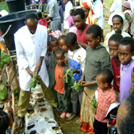 |
Goshu Worku (Ethiopia), & James Yasona (South Sudan) are working in urban agriculture with 270 children & 150 women suffering from shortages of household water and food shortages from a lack of agricultural water and adequate irrigation. Many of these individuals are living with HIV/AIDS—including orphans, vulnerable children & women.
|
Goshu and James developed a solution-oriented project that includes:
- Safe Water & Nutrition for people living with HIV/AIDS
- Water use management plan
- Climate smart agricultural practices program
- Family garden and nutrition program
- Community youth activity program
| 2. Southern Uganda | Water Scarcity | Drought | Water Management | Participatory Mapping |
|
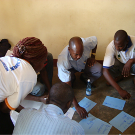 |
Elijah Kajubi (Uganda), Siobhan Girling (UK), Jeff DeBlieu (US) & Alba Perez (Vietnam) are working with 300 families in SW Uganda. These agricultural families suffer from widespread malnutrition caused by climate variability—including extreme drought that reduces crop yields & negatively impacts livestock.
|
The solutions that they have been developing include a community-based water use management plan which will combine local knowledge with scientific knowledge. Community members will first develop a participatory mapping of water resources and uses, and then consult with a water management expert to develop a participatory process and training program for developing the water use management plan.
| 3. Nigeria | Vulnerabilities | Irrigation | Coping Strategies | Drought | |
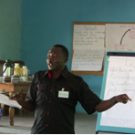 |
Talitha Tukura (Nigeria), Orleans Mfune (Zambia) and Conrad Otterness (US) spent eight months working with 200 families in Kwall, Nigeria who are suffering from chronic food shortages caused by a lack of access to water and from climate variability that impacts harvests.
|
These challenges exacerbate the already complex problem of poverty due to a lack of agricultural income. Combined, they lead to chronically malnourished and frequently ill children—and an inability to purchase food and pay for children’s education and health care.
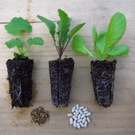 |
Here are a range of solutions in the form of programs and activities that past students have used successfully in addressing Project challenges. Feel free to use them, modify them, or develop your own solutions instead. Many of the programs are highly specific to one student’s project and will need to be adapted to fit yours. Many of the programs have multiple activities; these are to give you options for customizing your own programs: edit the activities down as you see fit for your project.
|
Would you like to learn how to develop Community Based Adaptation Projects?
What’s happening in the region where you live?
Please write us with your stories, thoughts and comments through Online.Learning@csd-i.org
Please write us with your stories, thoughts and comments through Online.Learning@csd-i.org
I look forward to hearing from you.
Sincerely,
Tim Magee, Executive Director
Would you like to subscribe to this newsletter?
The Center for Sustainable Development specializes in providing sound, evidence-based information, tools and training for humanitarian development professionals worldwide. CSDi is a 501(c)(3) nonprofit organization.
eLearning Final Call: Funding Projects | CBA | DRR | Water | Food Security | Climate Smart Ag.
Final Call: CSDi Fall Academy, 2012
Online Fall Academy: Funding Projects | Climate Smart Ag | CBA | DRR | Water | Food Security | Final Call October 30
Online Fall Academy: Funding Projects | Climate Smart Ag | CBA | DRR | Water | Food Security | Final Call October 30
Join us next week on October 30 for an intensive series of online field courses with other students from all over the world.
Online Development Courses: October 30, 2012
Advanced Courses:
Students from over 425 organizations in 140 countries have used these courses to develop projects impacting over 260,000 people.
| Fiji |
Loraini Sivo Wins $40K GEF Grant Award for Project Developed in Online Course |
 |
Loraini Sivo (Fiji) and Fatema Rajabali (UK) developed a project with a community of people in a village called Yadua. Read a description of the problem the community members faced based upon participatory needs assessment—and about their solution-oriented project design.
Says Loraini: “The course OL 341 helped me develop a concept for Yadua on a small scale ecosystem-based adaptation climate change project which was then submitted to GEF Small Grants. After a few consultation meetings with GEF, they informed me that they were willing to fund the project.”
|
Read about other successful student projects in the October Newsletter.
STEP 1. Enroll in the first course of this series: OL 341.
 |
341 Community Based Adaptation 1: Gain an insight into contemporary methods of developing community based, sustainable, impact-oriented projects. Gain practical field tools and develop a range of skills: facilitating participatory needs assessments and DRR assessments, designing projects, and evidence-based activities. Develop a real project in real time.
|
 |
342 Community Based Adaptation: Planning for Impact. Imbed impact into your adaptation project design with a powerful set of management tools. Log frames, detailed budgets, timelines, compelling fact sheets, M&E plans, outcomes and impact. These tools will communicate to donors and stakeholders exactly what you are trying to accomplish and can be used for effective management of the project once funded.
|
 |
343 Community Based Adaptation 3: The Community Focus. What does climate change adaptation mean at the community level? What practical tools are available today for communities to use in adaptation and in DRR? Conduct a baseline survey including climate vulnerability, risk assessment, an adaptation capacity analysis, and gain an understanding of local knowledge of a changing climate and of coping strategies. For practitioners who wish to begin working now at the community level to successfully adapt to the challenges that face us.
|
 |
344 Community Based Adaptation 4: Sustainable Implementation. How do you launch and implement a community based adaptation/DRR project? The importance of community engagement and project co-management. Developing skill sets for your community to use in the adaptation process. Learning tools: monitoring & evaluation. Community empowerment during project hand-over. Sustainability, follow-up & mentoring
|
 |
|
 |
303. Food Security, Nutrition and Home Gardens 1: Implement a 12-month family gardening project. Develop a baseline of your community’s food security and nutritional levels. Learn about food security, good nutrition, and the garden activities that support them—and then learn how to build a project that puts your community on the path to using their own skills to address their specific needs. Become the Solution.
|
 |
304. Food Security, Nutrition and Home Gardens 2: How do you care for & maintain a food garden? How do you control pests? What happens if you have desert soil—or a shortage of water? Learn how to combine garden produce with daily staples to prepare nutritious meals that contain vitamins A, C and D. Increase family understanding of kitchen hygiene, cooking, and nutrition—including using delicious nutrition-packed recipes.
|
 |
332. Water Conservation and Management: Students develop a community-based water use management plan with community members beginning with a participatory mapping of water resources and uses, and then consult with a water management expert to develop a training program in implementing conservation and water harvesting technologies.
|
 |
333. Climate Smart Agriculture. Students and their community members will develop a participatory mapping of crop systems, and soil and water resources, and then consult with an expert in soil, water and agriculture to develop a participatory training process for developing a Climate Smart Agricultural Program specific to their local context. The course includes an overview of climate smart agricultural practices complete with downloadable manuals and field guides for each technique.
|
 |
|
|
101. From the Ground Up: Designing & Funding Sustainable Projects. Develop a Real Project in Real Time. We’ll walk you, step-by-step, through a community-based project using proven methods. Learn a range of skills including participatory needs assessments, community capacity building workshops, and evidence-based project design. You will learn strategies from others in the class facing similar challenges. Become the Solution.
|
|
 |
102. Project Architecture: Planning for Impact. Imbed impact into your 101 project design with powerful management tools. LogFrames, detailed budgets, schedules, compelling fact sheets, M&E plans, outcomes & impact. These tools will communicate to donors & stakeholders exactly what your project will accomplish, and lead the effective management of the project once funded.
|
The Courses also Provide the Following Resources:
- Scholarship opportunities for citizens of developing nations.
- 300 adaptation field activities.
- Compilation of 50 full program outlines for use in project design.
- Manuals & field guides for project activities.
- Instructors that provide project consulting, suggestions, and encouragement individually for each student’s assignment.
- Access to tools and resources on the Center site.
- There are no books to buy—all course materials can be linked to, or downloaded from the course site.
Who should participate? Course participants are of all different ages, genders and professions—and have included Northern and Southern staff from INGOs, field staff from in-country NGOs, donors, executive directors, students, scientists, consultants and people who would like to transition into development work.
CSDi Online Courses Capture a True Field Experience
Our online courses use each class assignment as a concrete step in developing a real project within a real community. You will take an assignment into the field and use it as a solution-oriented activity that you do together with community members—thereby finishing one component of the project you are developing in the class. And there you have it: an online field course with tangible, concrete results.
Don’t have community access?
No problem: we partner you with a fellow student in a developing nation who does.
Questions? Just write us at Online.Learning@csd-i.org.
Would you like to learn more about what the course environment is like? Just visit these pages:
Be sure to visit CSDi’s Development Community. Join 700 colleagues in sharing resources & collaborating online.
Like us: CSDi Facebook.
Learn more about design and implementing CBA projects.
Learn more about design and implementing CBA projects.
Would you like to subscribe to this newsletter?
The Center for Sustainable Development specializes in providing sound, evidence-based information, tools and training for humanitarian development professionals worldwide. CSDi is a 501(c)(3) nonprofit organization.
October CSDi Newsletter—Climate Smart Agriculture
October CSDi Newsletter
Special Issue: Climate Smart Agriculture
GEF Grant | Lesotho | St. Lucia | Mozambique | Tanzania | Grenada | Fiji | CBA Resources
Special Issue: Climate Smart Agriculture
GEF Grant | Lesotho | St. Lucia | Mozambique | Tanzania | Grenada | Fiji | CBA Resources
THIS MONTH’S NEWS
The theme of this month’s newsletter has a special focus on climate smart agriculture for smallholder farmers. This was why we launched our online course—Climate Smart Agriculture—to address the fact that so many course participant’s projects have a basis in challenges with agriculture for subsistence farmers.
BECOME THE SOLUTION. Are you a donor, development practitioner, in transition, or a student who wants to learn more about “what works” in development? Join students world-wide to design, fund and launch a community based project. Student projects have utilized 270 different kinds of solution-oriented activities to address community need. Scan the list to see which would work best for your project.
| Tanzania |
Adaptation Through Conservation Agriculture |
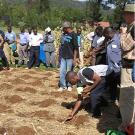 |
Chris Enns (Canada), has been working for the past 18 months on a project in the community of Wagete in the Region of Mara, Tanzania. 4,000 community members are suffering from reduced crop yields due to unpredictable weather patterns related to climate change.
Chris decided to launch a farmer soil and water conservation program, and in August led a very comprehensive conservation agriculture workshop. You can link to a report of the workshop complete with detailed photographs of the conservation agriculture techniques they used. |
| Saint Lucia |
Adaptation, Agriculture and Livelihoods |
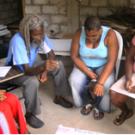 |
Brenda Wilson (Saint Lucia), has been working for the past four months on a project in the community of La Pointe, Micoud, St. Lucia. 25 households are suffering from low incomes from reduced crop production due to changes in weather patterns bringing extreme weather events such as hurricanes, and an increasingly unpredictable beginning and end to rainy season.
Brenda developed this project outline to increase crop production, reduce malnutrition and improve food security among children and the community. Download Brenda’s compelling two-page fact sheet.
|
| Mozambique | Finding Climate Smart Agricultural Solutions to Famine |
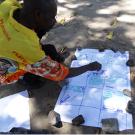 |
Phipps Campira (Mozambique), Zipo Akinyi (Kenya/New Zealand), and Lenneke Knoop (The Netherlands) have been working for the past two months on a project in the community of Mezimbite, Mozambique. 566 households (3,400 people) are frequently suffering from famine caused by a lack of knowledge of improved agricultural practices and climate change related unpredictable rain and extreme weather events.
The team developed this project outline to increase crop production, reduce malnutrition, improve food security, and reduce mortality rates among children and the community. Download their research on activity effectiveness. |
| Kingdom of Lesotho |
Climate Change and Poor Harvests |
 |
Mapale Matsela (Lesotho), Tavatya Joseph Madzvamuse (Uganda), and Nana Lupyani (Zambia) have been working for the past two months on a project in Mpharane, Lesotho. 40% of the population live below the poverty line of US $1.25 a day. 1,800 members of four villages in Mpharane are facing poor harvests due to climate change related unpredictable start of rainy season, unusual dry periods, and extreme weather events/floods.
The team developed this project outline to be able to enjoy improved nutrition and year-round food security food security through a climate smart agricultural practices program. Download their full project outline.
|
| Grenada |
Drought and Flooding: Dual Challenges |
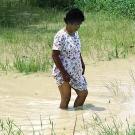 |
Gillian Primus (Grenada), Hanna Bartel (Canada), and Meredith Waters (US) have been working for the past year on a project on the island of Grenada; Grenada has been hit by a series of tropical hurricanes and tropical storms exhibiting increased ferocity over the past seven years. This has led to reduced crop harvests, a reduction in food security, increased malnutrition, and increased poverty.
The team originally developed this project outline to increase crop production, and are now looking for highly specific sub activities to target highly specific in-field challenges—such as drought and flood.
|
| Fiji |
Loraini Sivo Wins $40K GEF Grant Award for Project Developed in Online Course |
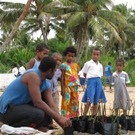 |
Loraini Sivo (Fiji) and Fatema Rajabali (UK) developed a project with a community of people in a village called Yadua. Read a description of the problem the community members faced based upon participatory needs assessment—and about their solution-oriented project design.
Says Loraini: “The course OL 341 helped me develop a concept for Yadua on a small scale ecosystem-based adaptation climate change project which was then submitted to GEF Small Grants. After a few consultation meetings with GEF, they informed me that they were willing to fund the project.”
|
| Spring Quarter | Are you interested in: |
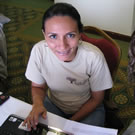 |
Would you like to learn how to develop Community Based Adaptation Projects?
What’s happening in the region where you live?
Please write us with your stories, thoughts and comments through Online.Learning@csd-i.org
Please write us with your stories, thoughts and comments through Online.Learning@csd-i.org
I look forward to hearing from you.
Sincerely,
Tim Magee, Executive Director
Would you like to subscribe to this newsletter?
The Center for Sustainable Development specializes in providing sound, evidence-based information, tools and training for humanitarian development professionals worldwide. CSDi is a 501(c)(3) nonprofit organization.
